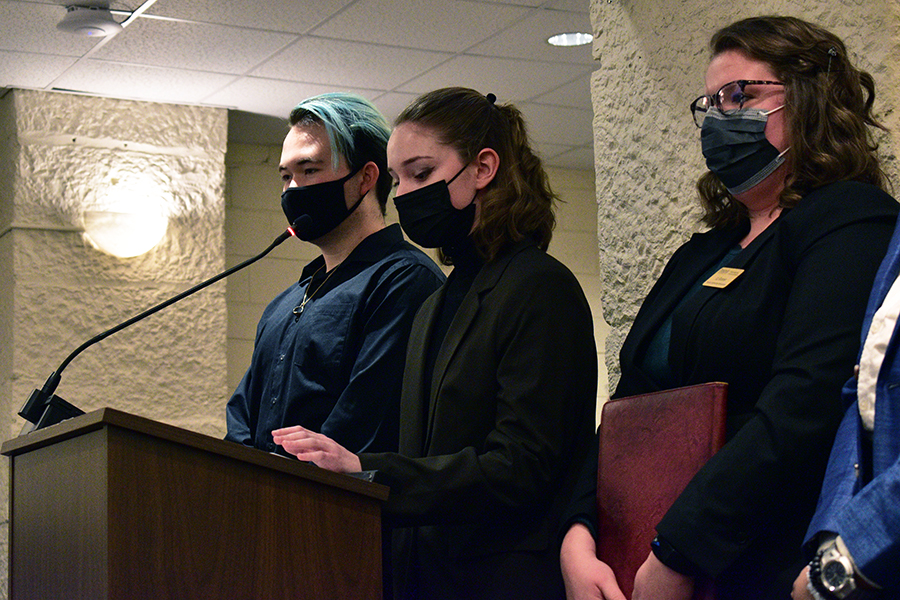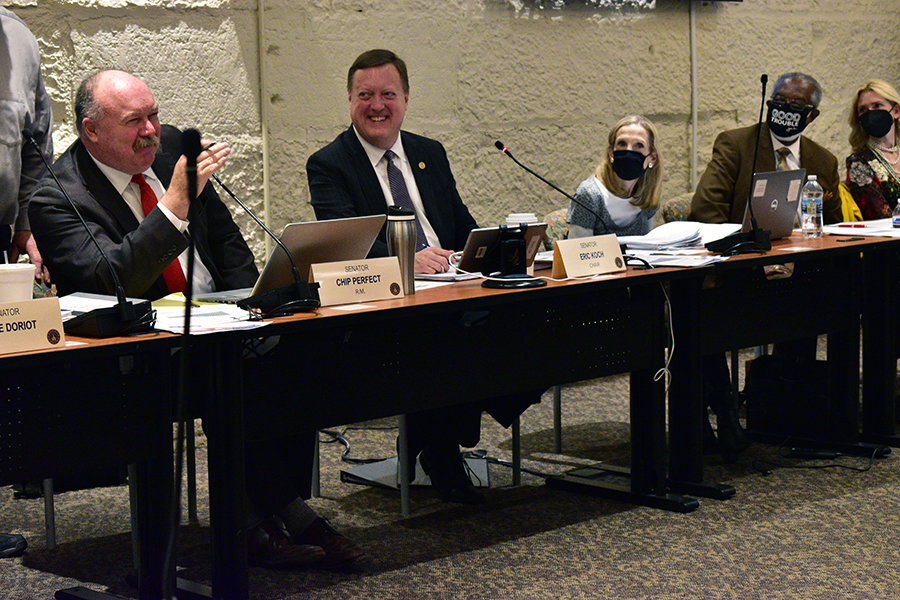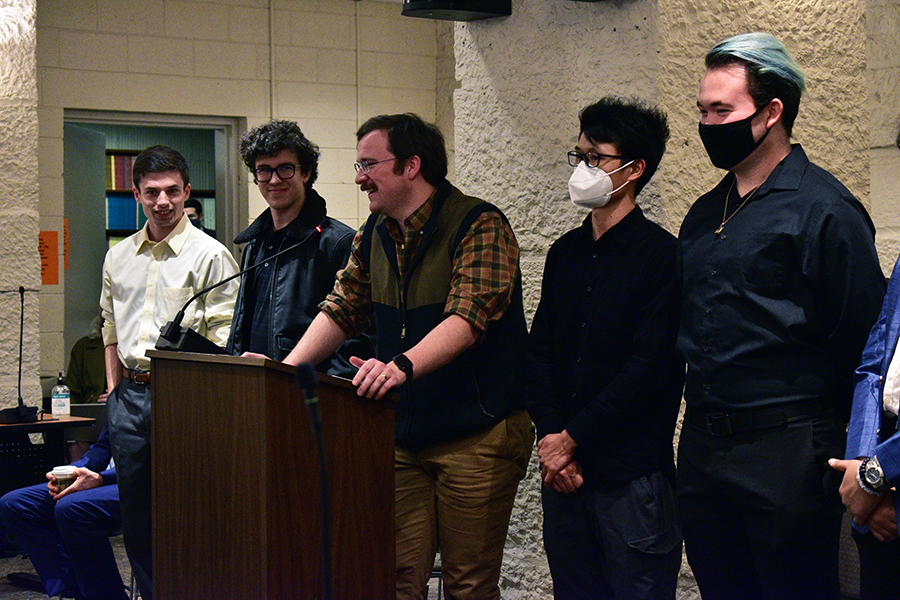NE students appeal to state legislators to move nuclear energy forward in Indiana

A delegation of students from the School of Nuclear Engineering traveled to the Indiana Statehouse in Indianapolis in early 2022 to support small modular reactors (SMR).
Senate Bill 271 creates a framework for Indiana to pursue nuclear energy alternatives in the form of SMRs. The bill paves the way for the Indiana Regulatory Commission to create rules for considering SMR proposals. Proponents say these new-generation reactors could replace retiring coal plants and help supplement renewables. Opponents fear higher expenses for consumers and harmful leftover toxic waste.
Senior Elizabeth Bramer and junior Morgan Smith, both students in NE, provided testimony during a Jan. 20 hearing of the Senate Utilities Committee while a group of their NE peers attended for added support.

Their testimonies, based on personal experiences, outlined three major points:
- Retain Indiana college graduates in the state workforce
- Provide a clean energy source in the state
- Create new jobs for future and current nuclear engineering graduates
“When looking for nuclear engineering programs, I was fortunate that there was a world-renowned one right in my backyard at Purdue,” Bramer said. “However, not long after committing to the program that I now love, I realized that I cannot work in the field of my dreams while remaining near my family in my home state because there are no jobs here in nuclear energy. I was heartbroken.”
After graduating in May, she will take an out-of-state job at GE Hitachi in its Stability & Radiological Analysis group in Wilmington, North Carolina.
“I entered the nuclear industry because I care deeply about our environment and want to help combat climate change,” Smith said in her testimony. “To some of you, ‘nuclear power’ and ‘environmentalism’ may seem like conflicting terms since vocal climate activists consider nuclear power to be dangerous. But nuclear energy, specifically this new generation of SMRs, is safer than the reactors of the past.”
Although Smith now lives in Ohio, she grew up in the Hoosier state.

“Indiana is where my love for science first sparked, and I want to see it benefit from every technological advancement possible," Smith said. "Having lived in Ohio, I have seen the benefits of our state’s nuclear reactors in creating job opportunities for our residents and allowing for a healthy STEM culture to blossom. I would like to see the same environment flourish in the state that I was lucky to call my home for 10 years.”
SMRs would create an abundance of high-paying jobs, Smith said. NuScale Power, which has the only Nuclear Regulatory Commission (NRC)-approved SMR design, estimates that 1,600 jobs would be created during a plant construction and add 667 jobs per year to the region in which it is built. Currently, there are no SMRs online in the United States, which Smith says presents an opportunity for Indiana.
“Upcoming graduates like myself would be highly motivated to move to or remain in Indiana for employment, bringing in hundreds of new taxpayers," Smith said. "Without this technology, students and other engineers seeking jobs will be forced to look for employment elsewhere in the country.”
After the proceeding, Seungjin Kim, the Capt. James McCarthy Jr. and Cheryl E. McCarthy Head of the School of Nuclear Engineering, expressed his gratitude to the student delegation.
“I believe our students played a key role in making a difference in the hearing," he said. "Their statements to the state legislators were authentic and timely, and I am very proud of them. They not only made our school proud, but they also made Purdue proud.”
Kim and the students learned later that Gov. Eric Holcomb signed the bill into law on March 18.
Suzie Jaworowski is a former senior advisor to the Office of Nuclear Energy in the U.S. Department of Energy. Currently, she is an energy infrastructure consultant, and NuScale is her client. She approached NE with the idea of students testifying and is glad she did.
“I was extremely impressed with Elizabeth and Morgan because they were so professional, confident, and knowledgeable," Jaworowski said. "Their testimony was especially impactful because they talked about wanting to use their nuclear engineering degree and work here in the State of Indiana. This impressed the committee because keeping talented young people in the state is an important goal.”
Stylianos Chatzidakis, assistant professor in the School of Nuclear Engineering, helped organize and escorted the student delegation.

“It was such a great experience to work with students who truly care about the State of Indiana and its future. We ought to find ways to keep those rare and talented engineers in Indiana, and the Senate Bill will help do just that,” Chatzidakis said.
Drew Ryan (BSNE ’18), a Rickover Fellow and graduate student in nuclear thermal-hydraulics at Purdue, offered brief comments at the hearing because he has a desire to see Indiana move toward a clean and consistent energy source like nuclear.
“Right now, despite having a great nuclear engineering program (at Purdue), there are no commercial reactors operating in the state. And there’s really no way to keep graduates around unless they change fields. When I graduate, I’ll be moving to Pittsburgh to work with the Navy as an engineer for its nuclear propulsion systems,” Ryan said.
Through a Purdue co-op placement, Bramer has worked at the Perry Nuclear Power Plant in Ohio, where she has had the opportunity to work "within a community that supports and benefits from a nuclear power plant."
"Even in my short time at the plant, several STEM outreach programs were conducted with local schools," she said. "I had the opportunity to speak with high school students and show them around the plant and our engineering space. I helped them understand that getting a job in engineering did not mean leaving the town they love.”
SMRs require less refueling than typical reactors, Smith said, requiring new fuel every three to seven years, as opposed to every one to two years.
“Nuclear power reduces carbon emissions by 470 million metric tons a year, which is the equivalent of taking 100 million passenger vehicles off the road," Smith said. "SMRs installed in Indiana would bring our state into a more environmentally conscious future, one that would ensure the livelihood of our future generations.”
For Bramer, providing testimony at the state level allowed her to flex both her engineering and political science muscles.
“I have a minor in engineering and public policy, which dives into the regulatory side of engineering. So, the hearing was a first-hand experience of something that I was particularly invested in and a great step toward introducing nuclear power to Indiana," Bramer said.
Smith also enjoyed the statehouse experience and the opportunity it provided.
“As nuclear engineers, we’re used to speaking to people with the same level of knowledge we have on the subject," she said. "Speaking to the senators was completely different because we really got to see how little the public knows about nuclear power and waste storage. It was eye opening to see that the biggest barrier to implementing nuclear power in the state is just misinformation.”
Bramer concluded her testimony with a direct appeal.
“We stand before you as a delegation of students, faculty, and staff from the School of Nuclear Engineering at Purdue University asking you to think wisely about your next steps with this bill. Nuclear is the future of our power grid and our careers, of this we are certain. However, with the current legislation in place, it is virtually impossible to help our state make this giant leap into the future, so we ask you to think about small modular reactors as the next small step to bringing Indiana into that promising future.”
NE students Brian Bettes, Jake Marr, Zhengting Quan, Asif Saadat and Jackson Wolf also were part of the Purdue delegation.
In a groundbreaking move, it was announced in April that Purdue and Duke Energy jointly will explore the feasibility of using the power produced through SMRs.
Source: Indianapolis Star
